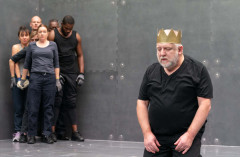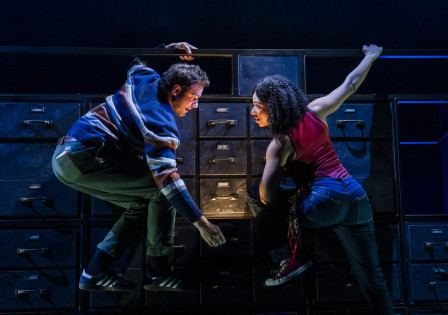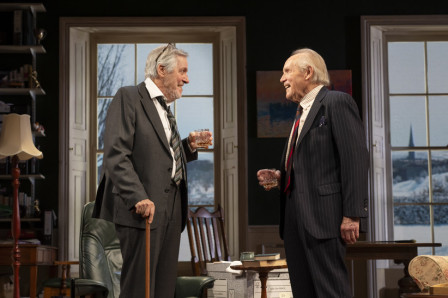Review: THE TRAGEDY OF RICHARD II at the Almeida
 Joe Hill-Gibbins has created a brilliant snapshot of what it must be like inside the head of a leader in chaos.
Joe Hill-Gibbins has created a brilliant snapshot of what it must be like inside the head of a leader in chaos.
First performed in 1597, you could be forgiven for thinking that the plot of King Richard II rings bells all over Brexit.
With a set that both resembles grey-matter and a bleak castle interior, we could have been witnessing the inverted brain of the King losing control. Ingenious. The cold cube holds Simon Russell-Beale prisoner, surrounded by a small but perfectly formed company of players who for me, represented his thoughts. With all forms of unnecessary embellishment stripped away in Ultz design, the plot is able to emerge clear as a bell. The crafty cast of players resemble a head full of problems for the King, seeming to torment him as his reign descends into turmoil. Nimble both physically and vocally a small cast of seven including Robin Weaver in a performance that marks for me, her best, navigate all of the characters. There’s no over indulgence or dull dwelling on a speech as the ensemble keep every beat active, Russell-Beale himself seeming never to need to breathe. In fact, I often wonder if over the years of mastering the language he’s developed stage gills?
In this production, trimmed to run for a swift ninety minutes of textual gymnastics we are treated to storytelling at its most active with every moment wrung for all the clarity the company could possibly find. Whole speeches could have been lifted from a private meeting between May, Johnson and Mogg in which she pleads for her fellow party members to quit brawling for the sake of their country: ‘civil wounds plough’d up with neighbours’ sword / sky-aspiring and ambitious thoughts / to wake our peace / in our country’s cradle’ – forgive the shameless trimming but Jo Hill-Gibbins has boldly cut and paste piece to great effect, so it seems apt.
If you’re looking for an exciting, first Shakespeare to introduce young people to, this would be perfect, being trimmed to run for a swift ninety minutes of clear, simple storytelling using textual gymnastics. Making history play like a thrilling tragedy it’s an opportunity to give young audiences the taste of how action packed it can be. As a big fan of the history plays, I particularly enjoyed Hill-Gibbins pinching Bolingbroke’s speech from Henry IV part II to frame his troubled ascension to the throne, forever to be riddled with doubt “uneasy lies the head that wears the crown”– and doesn’t Teresa May just know it.
Latest News

 Cast announced for the World Premiere of ALLEGRA
4 February 2026 at 15:02
Cast announced for the World Premiere of ALLEGRA
4 February 2026 at 15:02

 Cast announced for European premiere of THE JONATHAN LARSON PROJECT
4 February 2026 at 14:14
Cast announced for European premiere of THE JONATHAN LARSON PROJECT
4 February 2026 at 14:14

 Review: LOST ATOMS at Lyric Hammersmith
4 February 2026 at 12:08
Review: LOST ATOMS at Lyric Hammersmith
4 February 2026 at 12:08

 I'M SORRY, PRIME MINISTER at Apollo Theatre - Production images released
4 February 2026 at 10:41
I'M SORRY, PRIME MINISTER at Apollo Theatre - Production images released
4 February 2026 at 10:41
